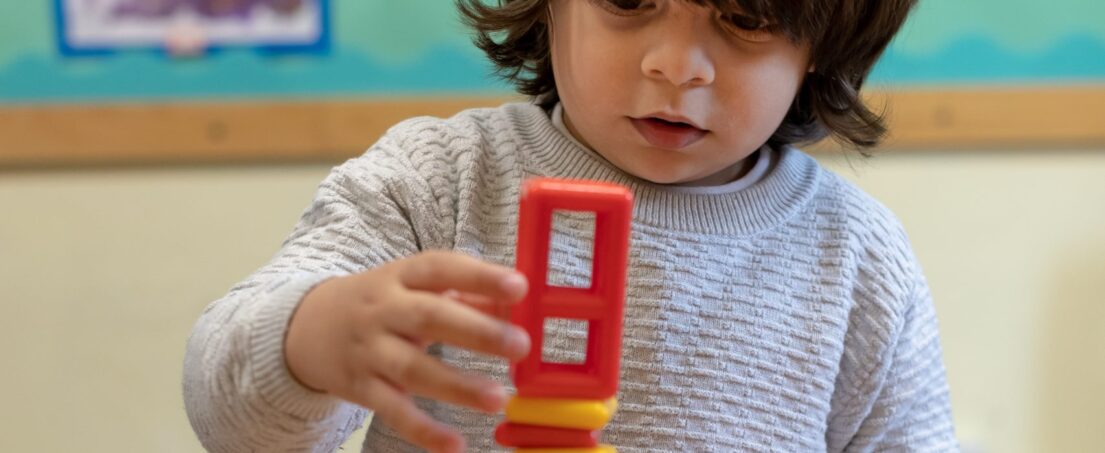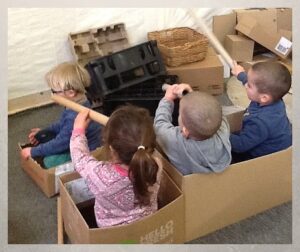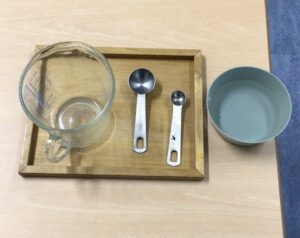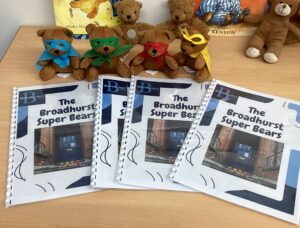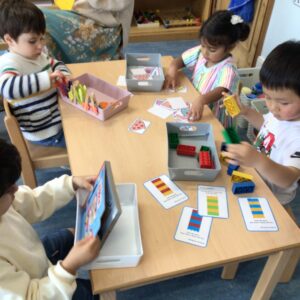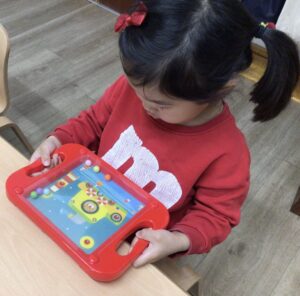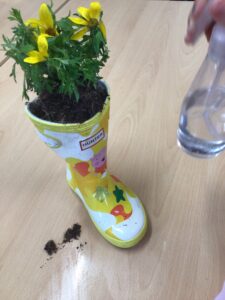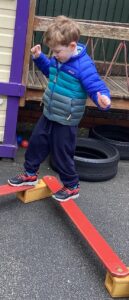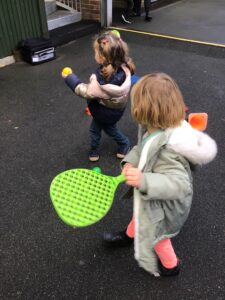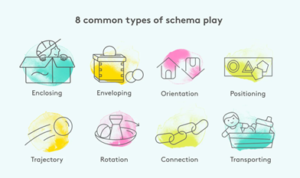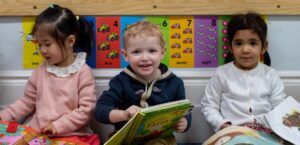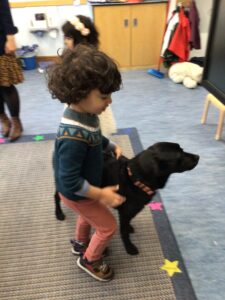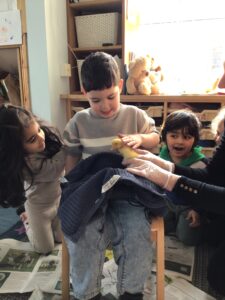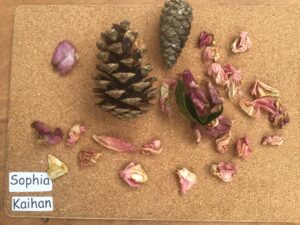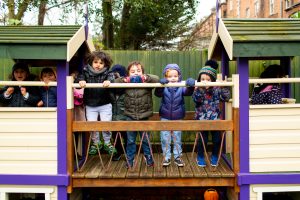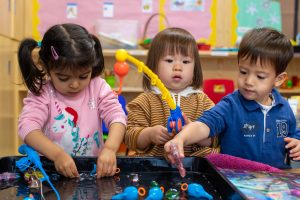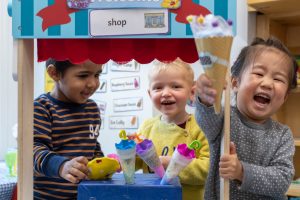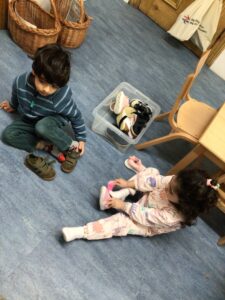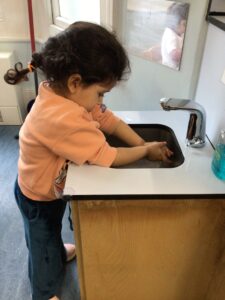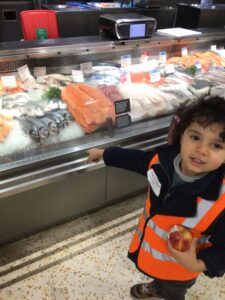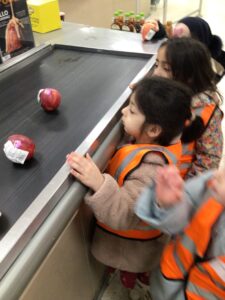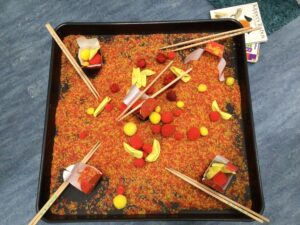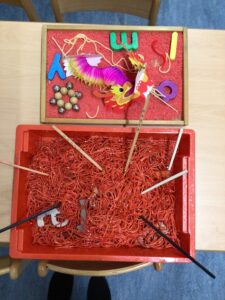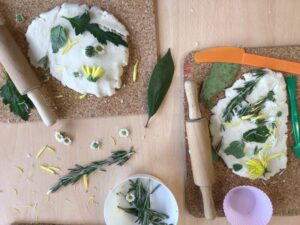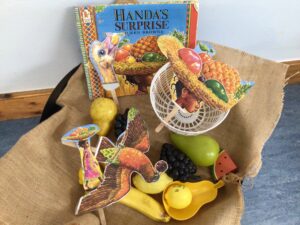School Blog
Importance of loose parts play in the Early Years
By Miss Rahman
Class 4 Teacher
Loose parts play has a crucial role in early childhood development, offering children the opportunity to engage in open-ended enquiry that fosters creativity, problem-solving and critical thinking skills. These materials, which can include anything from natural items like stones and sticks to everyday objects like boxes and fabric, encourage children to explore their environment and use their imagination.
One of the primary benefits of loose parts materials is that they promote hands-on learning. Children are naturally curious and when they have access to various materials, they can experiment and discover new ways to use them. This kind of play helps develop fine motor skills as children manipulate different objects.
Additionally, loose parts support social interaction among children. When playing with these materials, children often collaborate, negotiate, and communicate with one another, which builds their social skills and emotional intelligence. This type of play is not only enjoyable but also essential for holistic development, making loose parts a vital component of early childhood education.
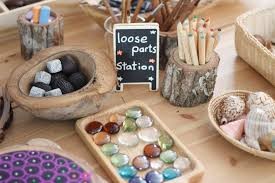
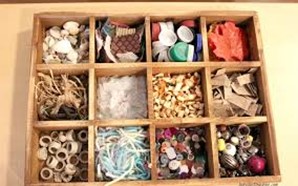
Deconstructed Role Play
By Mrs Roberts
Deputy Headmistress
Deconstructed Role Play is a designated area that contains a variety of different objects with no set purpose or goal. It encourages children to use their imagination and interpret objects according to their interests and lines of enquiry.
What are the benefits of deconstructed role play?
• Deconstructed role play does not limit imagination
• It encourages free thinking and the sharing of ideas
• It can be enhanced easily and used in many different ways
• It is not prescribed and allows children to nurture their interests
How can you set up a deconstructed role play?
Have you ever bought your child a toy and they have had just as much fun playing with the box it came in? Well, deconstructed role play is all about giving children objects that can be used in many ways.
You could use:
• Different-sized cardboard boxes
• Different-sized cloth and material
• Pipes and tubes
• Tins, cans and containers
• Baskets and buckets
How do we enhance deconstructed role play in the classroom?
We enhance deconstructed role play with different items to extend and invite children to play. For example, adding dolls, vehicles, containers or natural materials. The enhancements change the direction of the play and create a sense of excitement each time.


Cooking with Kids
By Miss Sendor
Class 5 Teacher
Why Involve Kids in the Kitchen?
They Love It!
Kids love being part of everyday activities. Cooking makes them feel like they are contributing and gives them pride in what they have made.
It is a Life Skill
They will refine their fine motor skills and learn about changes when mixing ingredients.
Here are some simple, hands-on tasks along with tips for making it a positive experience:
For 2-3 Year Old Children
Squeezing Orange Juice
squeeze oranges in a hand juicer to build strength and have fun with fresh juice.
Peeling and Cutting Apples
Use an apple slicer/corer, and they can help press down on it with your guidance.
Using a Hand Whisk
Support your child to use a hand whisk and talk about how the ingredients change. They will enjoy the mixing motion, whether pancakes, cake batter or eggs!
Making Lemon Water
Children can help squeeze lemon slices and place them in a water jug. It is a refreshing way to encourage keeping up their fluids.
Preparing Cereal for Breakfast
Use a small scoop for cereal and a little jug for milk. Children love being in charge of their breakfast.
For Kids 3+ Year Old
As they get older, children can try more advanced tasks with supervision:
Measuring Ingredients
Explore using scales, measuring cups, and spoons.
Knife Skills
Use child safe knives with soft foods like bananas or avocado.
Following Simple Recipes
Following step-by-step recipes and experiencing shared cooking becomes even more fun!
Tips for Cooking with Your Children:
Work Together at the Table
Take tasks like chopping to the dining table or bring a small table into the kitchen to create more space.
Lower Expectations
It is okay if things get messy! Some vegetables may not look perfect, and spills are all part of learning. Focus on enjoying the process.
Have Child-Sized Tools
Keep a small broom, dustpan, aprons and sponges within your child’s reach. They will love helping to clean up too!
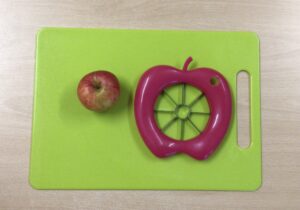
Happy Autumnal Equinox
By Miss Belzer
Headmistress
As the sun moves precisely above the equator, the sun’s path and the celestial equator align. In this moment, the length of day and night are exactly the same.
A few facts about the Autumnal Equinox include that it the second equinox of the year and in the southern hemisphere the equinox is reversed and so the season of spring blooms.
In 2024, the sun crossed the celestial equator – the imaginary line in the sky above the equator – from north to south at 12:44pm on the 22nd September. At this instant, the earths rotational axis was neither tilted away nor to the sun.
In school, we are celebrating Autumn with leaf printing, collecting Autumnal natural items and sorting their beautiful colours, learning about native animals such as squirrels and hedgehogs and enjoying non fiction and fiction books and stories about the turn of the season.
We wish you all a happy and fun filled Autumn season.
The Hygge Approach
By Miss Chloe
Class 3 Teacher
The Hygge approach, a key concept in current and contemporary schools of thought, is essential for enabling respectful and nurturing care. This approach focuses on the well-being of all by finding comfort in everyday life and the environment. It emphasizes providing comfort, feeling happy and secure with anything that can give a sense of familiarity. For instance, in a Hygge-inspired classroom, soft lighting, cosy reading corners, and natural materials are used to create a calming environment. Kimberly Smith, the founder of the Hygge approach in the early years, is passionate about child-led and nature-based learning. This approach has many benefits, one being that it provides children with an easier way to manage their emotions and promotes good self-regulation. Many case studies have found that the settings that follow this approach have observed more positive behaviour in children due to the calming environment. When we give children the opportunity to use their voices, it helps to promote self-esteem and self-worth. This is through giving them choices and options, and being able to share their emotions. When we allow children to use their voices, they will begin to develop and learn that they are important and valued as children and as people. Having the Hygge approach brings meaning to having a calm environment, and the environment connects with each child; this helps the children to see themselves within their surroundings. This approach is based on leisure and not rushing; having a slow and steady child-led approach allows the children to play and learn in a way that suits them. When researching this approach, I have come across many benefits. For example, this approach helps children feel secure, enabling them to let their guard down with their teachers and peers. The Hygge approach ensures that each child’s well-being is considered. Therefore, this means there will always be a nurturing and caring environment. At Broadhurst School, we create a calm environment through a soft pastel pallet of colours in class displays. Staff work at the children’s level and children have a balance of individual activities and collaborative play so that children are not pressured to have to share at all times. Our ‘Broadhurst Super Bears’ also nurture children’s emotional development and teach strategies for emotional regulation.
Supporting Bilingual Children in their Educational Journey
By Miss Luna
Class 4 Teacher
Understanding the unique journey of bilingual children is essential. With the UK’s evolving demographic landscape, driven significantly by immigration, a diverse multicultural society has emerged, especially in cities like London where over half of the population identifies with ethnic backgrounds other than British. In schools, this translates to more than one million children speaking languages other than English at home. This diversity brings rich cultural experiences but also unique challenges in education and identity formation.
Understanding Bilingualism: Bilingualism is not simply the ability to speak two languages fluently. It encompasses various levels of proficiency and usage across different contexts. Some bilingual children might understand their home language but primarily respond in English – a phenomenon known as passive bilingualism. This dynamic nature of bilingualism means children might excel in one language over the other depending on the context and frequency of use.
Multicultural Policies in Education: Despite the UK’s multicultural reality, educational policies have historically lagged in supporting bilingual students. Early policies often focused on assimilation, neglecting the unique cultural and linguistic needs of minority children. Reports like the Bullock Report (1975) and the Swann Report (1985) began recognising the importance of incorporating multicultural education to reflect Britan’s diversity. However, there remains a gap in effectively celebrating bilingualism as a strength rather than something to overcome.
Teachers’ Role in Identity Construction: Teachers play a crucial role in supporting bilingual children’s identity formation and their understanding of bilingual learning processes is crucial. Celebrating linguistic diversity in the classroom can enhance children’s confidence and participation, reducing feelings of insecurity and fostering a positive sense of identity.
Children at Broadhurst School frequently say good morning to their teachers in different languages and parents have visited classes to read a familiar story in a different language.
Effective Strategies for Support:
o Biliteracy Programs: Encouraging children to learn how to read and write in both languages helps them understand different writing systems and fosters a deeper connection to their cultural identities.
o Translanguaging: Using both languages alongside each other can facilitate better communication and learning, helping children feel more comfortable and valued.
o Parental Involvement: Rather than feeling pressured to speak only English at home, we encourage parents to use their native language, which can enhance their child’s overall linguistic competence and cultural identity.
For parents, supporting your child’s bilingual journey involves celebrating their linguistic and cultural diversity, advocating for inclusive educational practices, and staying engaged with teachers and school policies. By doing so, you help your child to build a confident, multifaceted identity in an increasingly diverse world.
Zone of Proximal Development
By Miss Samara
Class 6 Teacher
All children require guidance in their learning. However, what guidance one child needs will vary to the next. This is where the Zone of Proximal Development can be applied to ensure that all children’s learning needs are effectively catered for. The Zone of Proximal Development is defined as the space between what a learner can do independently and what they can do with support from an adult or with collaboration from a peer. When a task is outside of a child’s Zone of Proximal Development they may become frustrated and give up, even resulting in dislike of the subject in the future. This is why it is important to work within each individual child’s Zone of Proximal Development or provide the child with appropriate support until they master the task. In keeping with this ideology, one must learn to walk before they can run. For example, a child learning about numbers will draw upon their prior knowledge of numerals and counting. With support, they will be challenged to partition numbers and will use practical resources and strategies, such as, the part-part-whole method. Next, addition and subtraction may be introduced. By slowly increasing a child’s ability and confidence is a proven method for children to gain independence in their learning.
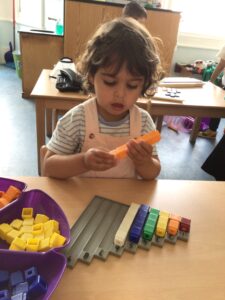
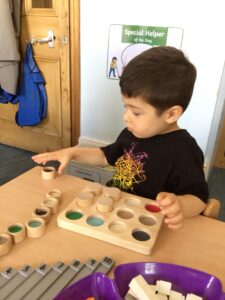
Active Learning
By Miss Magdalena
Class 5 Teacher
Active learning means children are mentally engaged as they interact with people, objects, materials and events. This type of learning keeps children deeply involved and focused on tasks for long periods. Active learning environments stimulate and spark curiosity, helping children develop their ideas and learn through discovery.
Theorists like Lev Vygotsky and Friedrich Froebel emphasized the importance of the learning environment. They highlighted the need for children to use their imagination and explore their world. The room layout and resources should make children feel comfortable and reflect their home and community while expanding their understanding of different people and cultures. The staff at Broadhurst School are passionate and creative about creating enticing role play areas and investigation trays that spark children’s curiosity and hook them into learning.
At Broadhurst School we observe how children handle challenges and solve problems. For instance, when building a tower with wooden blocks, we notice when children:
• try again when the tower falls
• balance each block more carefully
• choose a smaller block for the top
• start a new tower after reaching a certain height
• seek help to find a more stable way to build
When children accomplish their goals, no matter how small, they feel a sense of achievement that encourages future learning. They enjoy challenges and learn to try different approaches if something doesn’t work out initially. These skills are essential for school readiness and ongoing learning.
At home you can see active learning when your child:
• remains focused on activities for extended periods of time
• concentrates and pays attention to detail
• persists when faced with challenges
• solves problems and tries new strategies
• takes pride in their achievements
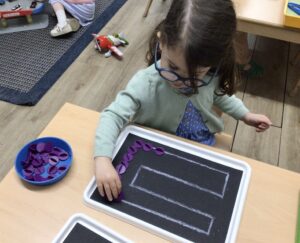
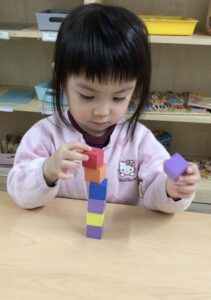
Gardening
By Miss Wigmore
Class 7 Teacher
Gardening with children is a wonderful way to teach children about the natural world. They gain knowledge about animals, biology, the ecosystem and the importance of taking care of our fragile world. Children can learn where food comes from, what plants need to grow and the names of insects and fauna. Gardening encourages children to eat a healthy diet as children who have grown fruit or vegetables are more likely to want to eat them! It is a wonderful way to encourage children to be active, get outdoors and can be both therapeutic and relaxing. The love and connection to nature can foster an appreciation for plants and the environment that stays with them for life. Overall, gardening is a hands on sensory-rich activity that provides numerous physical, emotional and educational benefits for children.
Gardening and planting activities inspired by stories children know and love can be a great way to entice children into the garden. Here are some suggestions:
Beanstalks – After reading Jack and the Bean Stalk, plant some beans in clear cups. This allows the roost to be visible and children can see the beans sprouting and the root growing. They can also measure the beanstalks with a ruler each week.
Cress Potato Heads – after reading the story book Supertato by Sue Hendra grow your own incredibly special Super-potato with green hair. First hollow out a raw potato and place cotton wool inside. Sprinkle in some cress seeds, draw a face on the potato and water. Soon you will have a potato with sprouting cress growing out of the top!
Carrot Tops- read the story Oliver’s Vegetables by Vivian French and grow your own carrot tops. Cut the tops off carrots and place them in a shallow bowl of water. Soon the tops will begin to sprout shoots and leaves.
Sunflowers- share the story Katie and the Sunflowers by James Mayhew and grow some beautiful sunflowers in a pot. Look for mini sunflower seeds which can be planted in small pots or window boxes. If you’re feeling adventurous go for giant sunflowers which you can be picked and place in a vase or dry the flower heads to give to the birds.
Paddington’s Wellington Boots – Paddington Bear loves wellington boots! You can use old wellingtons as a plant pot for herbs such as mint, parsley or the fragrant lemon verbena or even grow some wildflowers.
Superworm Hunt- the story Superworm by Julia Donaldson can inspire a minibeast hunt in the local park or in your garden. Look under leaves, pots and logs for creepy crawlies. Make a checklist and tick off the creatures you find.
Go Wild with Strawberries – inspired by the story Evie the Strawberry Fairy by Stefanie Dahle and grow some mini strawberries. Children will love seeing the flowers grow and red berries appear. You could even try growing them in a teapot.
Dinosaur Junk – use the storybook Dinosaurs and All That Rubbish by Michael Foreman to encourage children to recycle by planting flowers and seeds in old juice cartons, egg boxes and cartons.
Happy gardening!
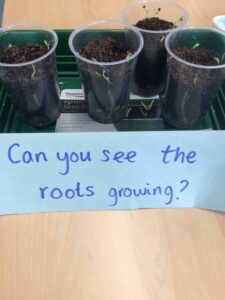

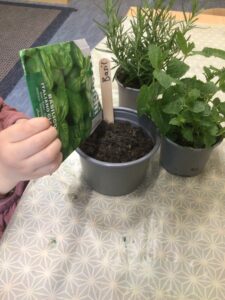
Building Blocks For Writing
By Miss Robb
Class 9 Teacher
Pre-writing skills are the fundamental skills children need to develop before they are able to write. These skills contribute to a child’s ability to hold and use a pencil and to draw, write, copy and colour. Children learn to control their bodies from the centre outwards and from the top downwards. For example, babies build up neck muscles in order to hold up their head and then trunk muscles so they can sit up. Lastly, they develop whole body control and balance required for walking. Arm and finger control for pre writing follows the same pattern. First a child will be able to manipulate the arm from the shoulder joint. Gradually they understand how to control their hands and finally they learn how to make the fine finger movements needed to write.
Building blocks that are essential for writing readiness are:
- Hand and finger strength: An ability to exert force against resistance using the hands and fingers that allows the necessary muscle power for controlled movement of the pencil.
- Crossing the mid-line: The ability to cross the imaginary line running from a person’s nose to pelvis that divides the body into left and right sides.
- Pencil grasp: The efficiency of how the pencil is held, allowing age appropriate pencil movement generation.
- Hand eye coordination: The ability to process information received from the eyes to control, guide and direct the hands in the performance of a task such as handwriting.
- Bilateral integration: Using two hands together with one hand leading e.g. holding and moving the pencil with the dominant hand while the other hand helps by holding the writing paper.
- Upper body strength: The strength and stability provided by the shoulder to allow controlled hand movement for good pencil control.
- Object manipulation: The ability to skilfully manipulate tools including holding and moving pencils and scissors and controlled use of everyday tools such as a toothbrush, hairbrush, cutlery.
- Visual perception: The brain’s ability to interpret and make sense of visual images seen by the eyes, such as letters and numbers.
- Hand dominance: The consistent use of one (usually the same) hand for task performance, which allows refined skills to develop.
- Hand division: Using just the thumb, index and middle finger for manipulation, leaving the fourth and little finger tucked into the palm stabilizing the other fingers but not participating.
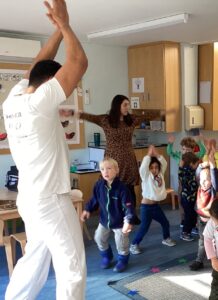
Mark Making in the Early Years
By Class 10 Teacher
Mark making is the first step in children’s journey towards writing that can be understood by others. Over time and with support, children’s mark making changes into something that is recognisably writing. To the untrained eye, early mark making may look inconsequential as children scribble, splat, and make marks in spilt milk with their fingers, but this process helps children to develop the skills and attitudes needed to become confident and competent writers.
A wide range of opportunities to engage in mark making activities is essential, especially in the early stages of mark making. At Broadhurst you will see a variety of Mark making happening in our classrooms from painting with leaves, scribbling with crayons or making marks in sand with sticks. All these activities help children to develop hand-eye co-ordination as well as gross motor skills, which are essential before a child can learn to write.
As children experiment with making marks, they are learning to use their bodies in different ways. This can promote fine and gross motor skills, different grips, and control over their bodies which will all be used when they come to write. Mark making outside on a bigger scale is important as it encourages whole arm movements which begins a foundation of muscle movements which are essential before children can learn how to hold a pencil correctly.
Mark making and drawing lines or patterns that represent something else is a good way for children to express themselves creatively. It can also offer them a new way to express their feelings. This is a great way to spark their imagination and share their thoughts through pictures and stories.
A Little Sparkle at Broadhurst!
By Mrs Roberts
Deputy Headmistress
I do not doubt that Broadhurst children talk excitedly and enthusiastically about their music sessions with Mrs. Sparkles every Friday. Music holds a special power in the early years, it boosts brain development, improves well-being and nurtures happiness. Through music, we can advance early language development, instill patience and support emotional regulation.
Our Sparkles Music sessions are delivered by a highly talented professional musician and incorporates the seven areas of learning within the Early Years curriculum. This term, the children will be focusing on rhythm, pulse, dynamics, matching pitch, musical memory and tempo. These skills are consolidated throughout the weeks and many activities are repeated to promote skill acquisition over time. The music lessons follow a recognizable routine to ensure that children feel confident and happy to sing and join in fully.
How can you continue the ‘Sparkle’ at home:
• Sing regularly with your children
• Listen to different types of music
• Explore instruments and making noise during play
• Have a regular song that accompanies the daily routine, for example, brushing teeth song.
Every time you sing a song or say a rhyme, children develop a plethora of skills. You do not have to be a confident singer or musician to develop music skills in your children; so, sing loud and proud, and move to the beat because music matters!
The Vital Role of Gross Motor Activities in Early Childhood Development
By Miss Rieffel
Class 8 Teacher
Gross motor skills are not only fundamental for physical tasks but also pivotal for cognitive, social, and emotional growth. By nurturing both outdoor and indoor activities we can help children build independence, confidence and core stability. Below, we will delve into the reasoning behind why gross motor activities are so essential and how they benefit young children all the way into adulthood.
Physical Health: Involving larger muscle groups, gross motor activities are imperative for overall physical health. They promote cardiovascular fitness, muscle strength and endurance.
Development of Motor Skills: These activities help in developing fundamental skills like walking, running and jumping. Early engagement in such activities lays a foundation for physical competence and confidence.
Balance and Coordination: Gross motor skills are vital for balance and coordination. Activities such as riding bicycles or playing team sports are not just fun but are also important for physical development.
Social Skills and Confidence: Many gross motor activities are inherently social. Participating in team sports or playground games develops teamwork, social interactions and boosts self-esteem.
Brain Development: Physical activity is beneficial for brain health, enhancing functions such as memory, attention and processing speed.
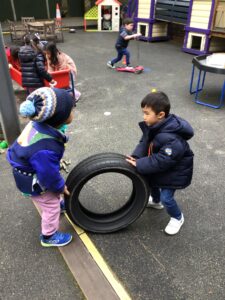
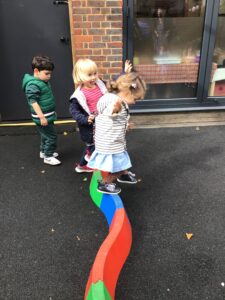
The Significance of Schemas in Early Years
By Class 1 Teacher
Swiss Psychologist Jean Piaget conceptualised Schemas as patterns of repeated behaviours and actions that play a crucial role in the cognitive and emotional development of young children. They are innate, repetitive actions or behaviours that children engage in during their play. For example, transporting, enveloping, rotating, connecting, and trajectory. Recognising and identifying these patterns enables both educators and parents alike to create a positive and unified learning environment that fosters the advancement of a child’s learning potential, whilst taking into account their natural tendencies.
Schemas are fundamental building blocks in cognitive development. By recognising and encouraging these patterns, we can enhance a child’s problem-solving skills, critical thinking, and understanding of cause and effect. For instance, a child consistently transporting objects from one place to another may be developing spatial awareness and coordination.
Every child exhibits unique schemas, and acknowledging these differences is essential for personalised education. By tailoring activities and materials to align with a child’s dominant schemas, we can create a more engaging and effective learning experience. This approach fosters a sense of autonomy and self-discovery, crucial for early childhood development.
Schemas also contribute significantly to a child’s socio-emotional development. Engaging in repetitive actions provides a sense of comfort and security, aiding in emotional regulation. Moreover, collaborative play involving shared schemas encourages communication, teamwork, and the development of social bonds among peers.
Integrating schemas into early years education involves creating a rich and diverse learning environment. This may include offering a variety of materials, such as loose parts, open-ended toys, and natural elements to support different schemas.
In conclusion, understanding and incorporating schemas into early years education is vital for promoting holistic development. Detailed regular observation and documentation are key tools in identifying and responding to individual schema preferences effectively. By recognising and embracing these patterns, educators can create a learning environment that nurtures cognitive, socio-emotional, and individualised learning experiences for young children, setting the foundation for a lifetime of successful learning.
Nurturing Communication and Language Development in Early Childhood
By Miss Giorgia
Class 2 Teacher
Communication and Language development in early childhood is a critical foundation for a child’s holistic growth and development. From babbling to constructing sentences, children progress through various stages of language acquisition, greatly influenced by their interactions with adults and their surrounding environment. Research illustrates that as infants begin to grasp words, their vocabulary expands rapidly, shaping their ability to comprehend and navigate the world around them.
By the age of 1, children typically recognize around 50 words. This number escalates significantly by age 3, with children commonly understanding about 1,000 words. By age 5, this vocabulary typically expands to an impressive 10,000 words. A rich vocabulary not only enhances communication but also facilitates cognitive development, allowing children to make sense of their experiences and surroundings.
Hands-on experiences play a vital role in language acquisition. Activities like painting, exploring nature, and playing with toys all provide contexts for learning new words. For instance, touching and tasting vegetables during a gardening activity not only teaches children about nature but also introduces them to new vocabulary. Pretend play and storytelling with props offer opportunities for children to deepen their language skills. By engaging in imaginative play with dolls, blocks, or other materials, children not only expand their vocabulary but also develop problem-solving skills and creativity.
Furthermore, adults play a crucial role in supporting children’s language development. By narrating children’s play and using simple, repetitive phrases, adults can help children understand complex concepts without overwhelming them. Sensitively introducing language during relevant moments and offering manageable amounts of information allows children ample time to process and internalize language.
In conclusion, communication and language development in early childhood is essential for children’s overall growth and success. By creating language-rich environments and providing opportunities for meaningful interactions, caregivers and educators can support children in building strong communication skills, fostering cognitive development, and laying the groundwork for future academic success.
Animal Encounters!
By Miss Belzer
Headmistress
We had a fantastic experience with Arc Farm on Monday 11th March 2024. The children met rabbits, guinea pigs, a tortoise, a miniature door mouse, a lizard, a hedgehog, an owl and even a Chinchilla! Nikayou the Labrador was very gentle and friendly and she received lots of pats, hugs and tummy rubs from the children.
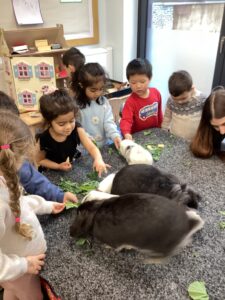
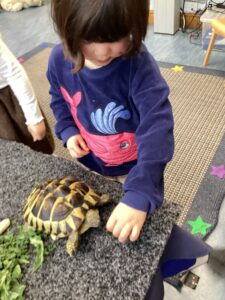
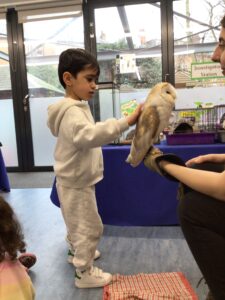
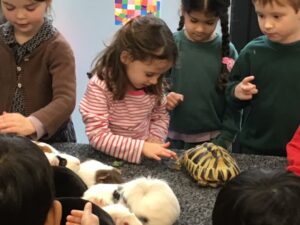
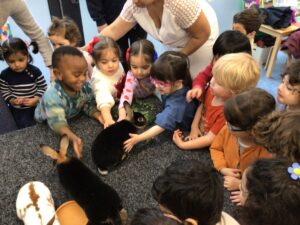
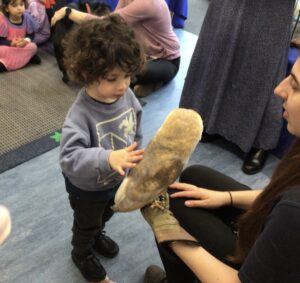
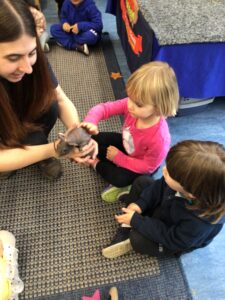
Our ducklings also had a fantastic week at Broadhurst. They have been swimming, playing up and down slippery slides and snuggling in little hands holding them. The children have thoroughly enjoyed watching the ducklings eating, drinking and growing bigger every day.
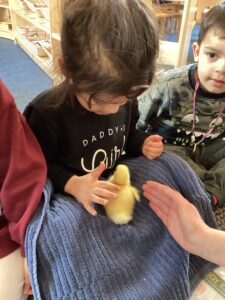
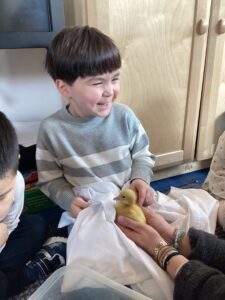
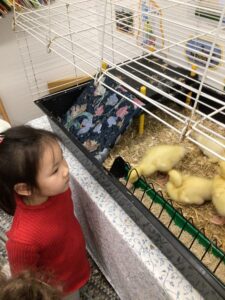
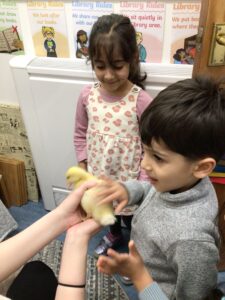
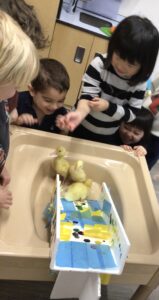
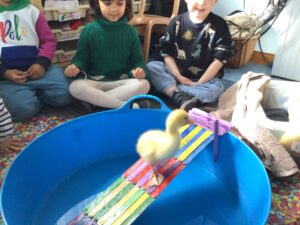
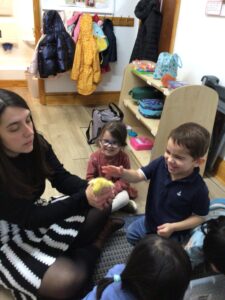
Forest School
By Miss Chloe
Class 3 Teacher
Forest School is an approach that specialises in learning within nature and aims to develop children’s confidence and self-esteem. This educational approach has many benefits including improving physical health, building language and communication and improving well-being. Forest School helps children accomplish more than they would inside a classroom. It is child centred through both planned and child initiated activities and allows for safe risk taking. This, in turn, encourages children to discover their independence.
At school, the children have begun making visits to our new Enchanted Forest area and have enjoyed nature crafts including weaving with natural materials and making bird feeders.
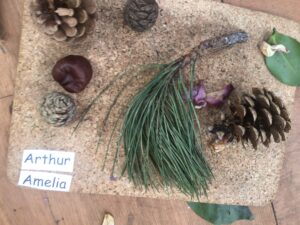
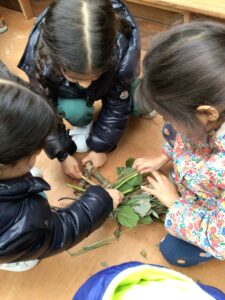
Risky Play in Early Years
By Miss Luna
Class 4 Teacher
Risky play refers to those activities that aim to challenge children’s physical development. More specifically, it entails activities that involve gross motor balancing such as climbing in, through, under or over apparatus. Over the course of generations, children’s engagement in risky play is diminishing due to generational trends, parental styles and societal concerns. However, there are countless reasons why risky play should always be encouraged. Children should have frequent opportunities to engage in such activities not only to benefit their physical development but also for their cognitive, social and language skills. Engaging in risky play, particularly during early childhood, can be thrilling and memorable, providing a rush of adrenaline that energises and excites. Participating in risky play helps children develop critical thinking skills by encouraging them to assess situations, consider consequences, and navigate risks safely. This early exposure fosters a foundation for effective risk management, enabling children to understand how to keep themselves safe. Additionally, risky play supports self-driven exploration, encouraging children to develop the skills necessary for lifelong learning. By navigating risks independently, children gain confidence in their abilities, judgment, and social interactions. This form of play also promotes pushing the boundaries of physical development.
Personal, Social and Emotional Development
By Miss Belzer
Headmistress
Personal, Social and Emotional Development (PSED) involves helping children develop a positive sense of themselves and others in order to form positive relationships. Children develop respect for others, social skills and learn how to manage their feelings. They also understand appropriate behaviour in groups and learn to have confidence in their own abilities.
This area of the Early Years curriculum develops children’s positive sense of themselves. It teaches about having respect for oneself and others, developing social skills and a good attitude to learning.
PSED is made up of these aspects:
Self Confidence and Self Awareness – children grow confidence to try new activities and to speak in a familiar group. They say why they like some activities more than others, talk about their ideas and will choose the resources they need for their chosen activities.
Managing Feelings and Behaviour – children experience about how they and others express feelings and learn about their own and others behaviour. Children work as part of a group or class, and understand to follow the rules. They adjust their behaviour to different situations, and take changes of routine in their stride.
Making Relationships – children play cooperatively, taking turns with others. They take account of one another’s ideas about how to organise their activity. They show sensitivity to others’ needs and feelings, and form positive relationships with adults and other children.
Montessori Activities At Home
By Miss Magdalena
Class 5 Teacher
Curiosity Baskets at Broadhurst school are inspired by many Montessori ideas. They can also be set up at home and can be fantastic for keeping energetic kids calm. For example:
• Peeling and cutting bananas
• Washing dishes
• Pouring water into a cup for drinking
• Watering plants
• Setting the table
• Serving breakfast e.g. scooping cereal into a bowl
Useful Tips:
• Think about the steps, not just the end result
• Find baskets, trays, and simple containers to organize items for your child to help with
• Make it accessible and presentable for your child
Benefits:
• Your child learns to help at home and working together creates a strong bond.
• There are many chances to learn new words and talk about what you are doing
• Your child learns new things, becomes more independent, and feels like they can do things on their own

Independence
By Miss Samara
Class 6 Teacher
Independence is a vital skill that needs to be nurtured early in life, as this way children are being shown the importance of being self-sufficient from a young age. In fact, many children demonstrate the desire to be independent with no encouragement from an adult. As a parent it is sometimes hard to sit and watch your child struggle and to maintain your patience so as not to intervene, especially when the child doing the task themselves takes more time. However, this is when it is crucial to remember that opportunities to be independent are immensely important for building a sense of self and self-esteem as well as developing perseverance.
With this in mind, a great starting point to foster independence is to set and stick to a familiar routine. This way your child will know what to expect and what events come next. For example, if you have the shoes and coat you are planning for your child to wear by the door, this will signal to your child the expectation to put these on. Eventually, the aim is for your child to do this task with no prompting required. Once your child can complete a few simple tasks independently, more expectations can be added.
Other ways to foster independence in your child is to have them help with daily routines such as mealtimes. Children are more than capable of feeding themselves from an early age. In fact, self-feeding will likely also encourage your child to taste new things on their own. Additionally, children can be encouraged to take on responsibility with certain self-help skills, such as, hand washing, dressing and self serving at snack times.
Another opportunity to develop independence in children is to provide them with choice; this certainly does not mean they have free rein. By offering your child two options that are acceptable to you, or by having them assist in the decision-making process, your child has the chance to assert their autonomy in an appropriate manner.
At school we nurture children’s independence by children putting on their own coat, changing into wellington boots, washing hands, using cutlery, accessing classroom resources, choosing their own activities and looking at story books.
Adventures and Experiences at Broadhurst
By Miss Belzer
Headmistress
This week the Nursery children visited Waitrose on their first school trip. It was impressive to see our Broadhurst School children composing themselves in public and displaying their manners in spite of their excitement and enthusiasm. The children absolutely loved weighing their piece of fruit, printing their price sticker and taking it to the checkout. In addition, the children went on a treasure hunt around the store and found the bakery as well as the cheese and fish and counters. Back at school, the children made delicious fruit salad with their chosen fruits.
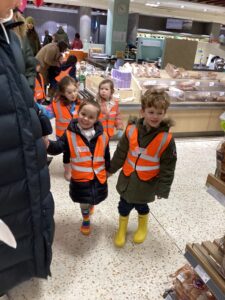
Celebrations for Luna New Year were happening across all our classes and our school has been vibrant in red this week. Activities have included dragons crafts, sensory play with red and yellow rice, experimenting with chopsticks, dragon and lion dances and reading the Zodiac story. We wish all our families celebrating, a very Happy Luna New Year.
Successful Storytime
By Mrs Roberts
Deputy Headmistress
National Storytelling Week is an opportune time to consider what makes a successful story time and how we can nurture, from an early age, a true love of reading. There is much more to reading than phonics, although phonics is essential for decoding and blending words. Additionally, we must create wonderment and joy around reading from an early age. Stories support children to grow vocabulary, increase attention, extend understanding and foster imagination. A quality story time will have many components and considerations, some are listed below.
• Take into consideration the book and if it sparks interest.
• Pre-teach any content in the story that a child may not understand. For example, an unfamiliar object or word throughout the book that needs explanation or demonstration.
• Include incidental teaching as you read, refer to the parts of the book, for example, the spine, blurb, illustrations and the author.
• Encourage participation including joining in with repeated refrains and acting out parts of the story.
• Predict what might happen next or ponder an alternative ending.
• Follow up on the story, create activities and further learning to extend the experience.
• Revisit and repeat favourite stories and discover something new each time.
• Finally, story time is an excellent way to connect in this busy world, take your time, get comfortable and enjoy the adventure that is reading.
“If you don’t like to read, you haven’t found the right book.”
J.K Rowling

